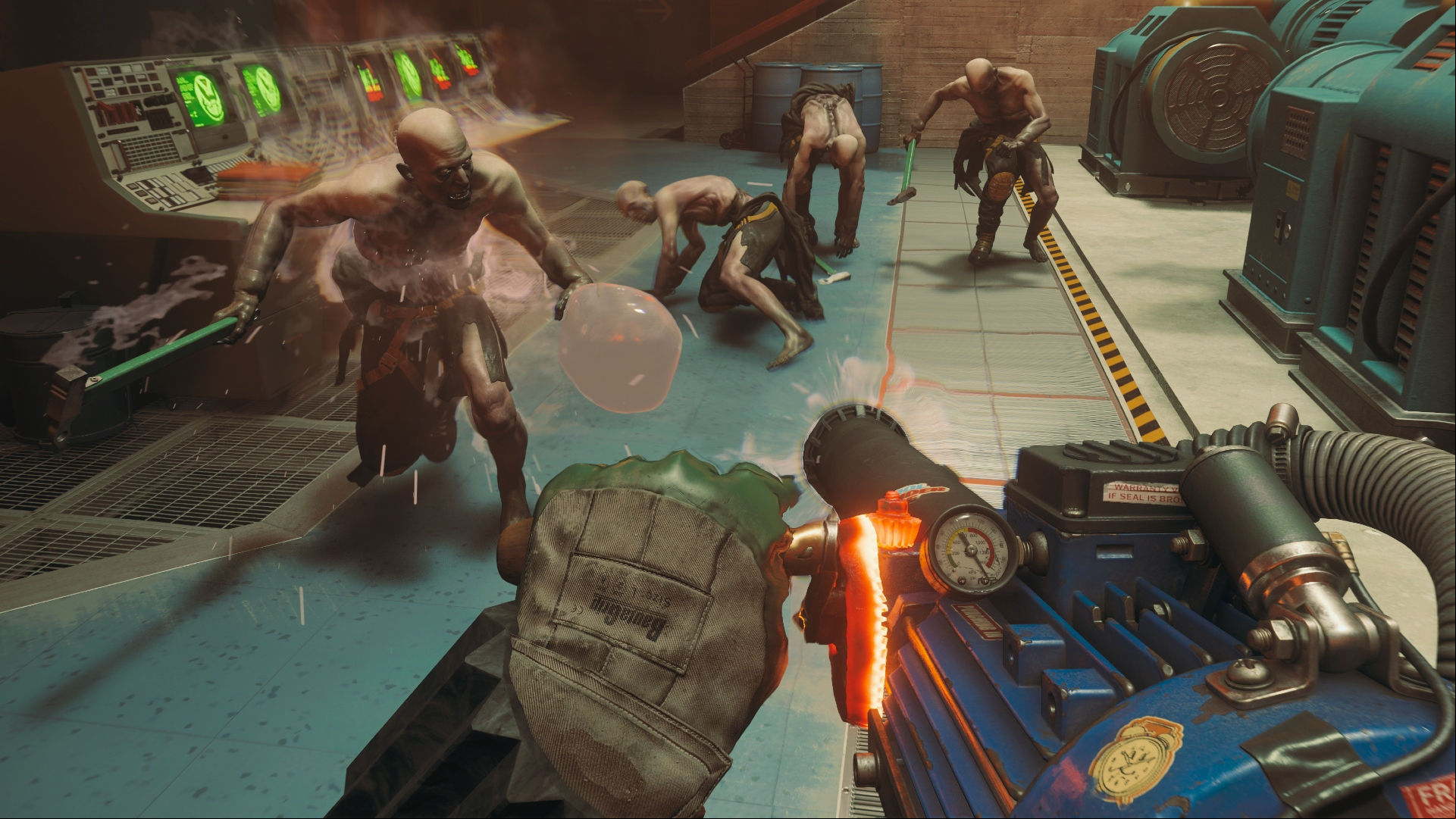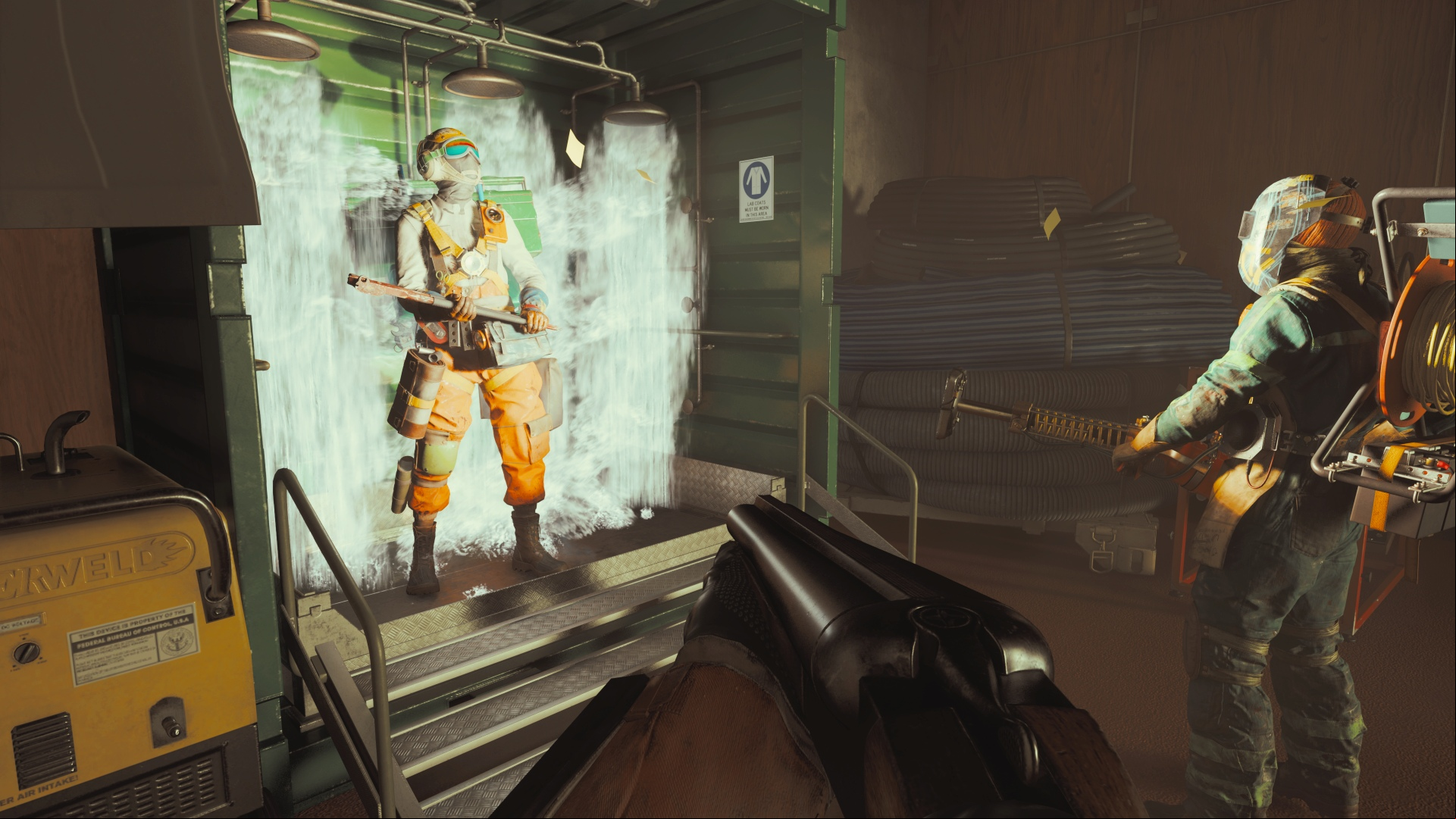We've seen it all end in tears before. A beloved studio makes a name for itself creating revered, narrative-driven, single-player action games, and then puts out an investor-satisfying multiplayer game that fails to deliver. But with FBC Firebreak, Remedy Entertainment's co-op FPS set within the besieged walls of Control's Oldest House, things have felt different from the very start. A focus on eccentricity, scalable difficulties and session lengths, and an anti-live service approach positions it as a refreshing multiplayer experience. But is it just as fresh to play? After getting around three hours of hands-on time with FBC Firebreak at Remedy's home base in Finland, I'm pleased to say that while it doesn't do much to revolutionize the co-op shooter gameplay loop, it's an absolute hoot.
FBC Firebreak may be a radically different game to Control, but it's still firmly rooted in its universe and, even more importantly, leans into its predecessor's ability to surprise. You certainly don't have to play Control before jumping into Firebreak, but it may enhance your enjoyment and appreciation of it if you do. As a quick narrative primer, though, the Hiss are breaching the Federal Bureau of Control in vast quantities, and trios of devoted employees volunteer to head into the building's most infested zones to clear them out.
While missions (dubbed 'jobs') offer chaotic, challenging, and occasionally confusing moments, FBC Firebreak is straightforward when it comes to gearing up. The core strategic element of your loadout is your crisis kit. For the duration of the preview, I opted for the splash kit, which features a water cannon for putting out fires, a placeable fountain that heals anyone standing in its radius, and an ultimate ability that turns your water into a flamethrower of scalding water. Given this was more of a role than an offensive one, I still had a blast using it.
Your co-op trio can opt to use the same crisis kit, but I'd recommend trying to keep things more balanced. Some kits are better for handling specific objectives than others – for example, if something needs repairing, the fix kit is your best friend. That said, it's not essential to select the optimal class for the job. Any player can manually perform any task by doing a minigame, but this will take longer and leave you vulnerable to attack from any nearby Hiss.

Other elements of your loadout include a primary weapon (the MP40-style submachine gun was my go-to) and a grenade, and that's it. No tinkering around in gunsmith menus finding the perfect barrel for your gun, no equipment wheels stuffed with gadgets; it's all pleasantly straightforward. Of course, you can also buy upgrades for your crisis kit, weapon, and grenade using a currency called lost assets. Perks let you enhance your build further, but this all hits the right balance between 'basic' and 'complicated.'
FBC Firebreak strikes a similar balance with its action. The gunplay isn't exactly hardcore, but it does regularly force you to be smart and conservative with your ammo. There are shelters for you to find and open, which act as respawn points and contain extra bullets, grenades, and health. While not a core focus, there's an encouraging nudge to explore every inch of each level as you never know when you'll find collectible files lying around.

Match objectives boast some Remedy eccentricity and no shortage of obstacles to throw your way, including the Hiss. I was surprised by the strong enemy variety and the distinct threats they pose. Other threats include environmental factors, such as heat rays that blast out from giant industrial fans.
One of Firebreak's greatest strengths is its elemental sandbox. From what I'd seen, and from how other games often treat elemental effects, I didn't think this would be particularly deep or impressive. Fire puts out water, water conducts electricity, that sort of thing. But it goes well beyond that.
Shooting a fire extinguisher can freeze nearby enemies affected by water or (in the absence of being able to stop, drop, and roll) put you out if you find yourself ablaze. The breeze generated by using a zipline or falling from a height will also extinguish flames. Some radioactive items will leave you with an irradiated debuff that'll chip away at your health. While this allows for reactive experimentation, it was occasionally difficult to figure out exactly what killed me in the heat of battle when I didn't have time to glance at the HUD's small elemental debuff icons.

Overall, Firebreak's gameplay is strong, and while it doesn't offer anything revolutionary, it serves us plenty of satisfying slaying, teamwork, replayability, and memorable, emergent moments. In truth, though, you'll encounter FBC Firebreak's best idea before you've even fired a single bullet.
Remedy gives you a lot of control (pun not intended) over the difficulty and length of each run. Three clearance levels decide the number of zones you must complete within each mission. You can choose to do just one zone, resulting in a match that may last a mere five minutes, or the full three-zone run with a final boss encounter. Then you have your threat level, which is your classic difficulty setting that both increases enemy numbers and how many powerful Hiss you'll encounter. Finally, your corruption level adds extra modifiers and tasks you with hunting peculiar corrupted items hidden away somewhere in each job.
I know menu options don't seem like the most exciting topic, but this is probably the biggest thing that will keep people coming back, make things accessible for casual and time-strapped players, and ensure hardcore co-op shooter fans are catered to.

My one overarching concern is that it took me a while to warm to FBC Firebreak. Most of my positive thoughts stem from the final half of my preview session, rather than the first. While I don't want to end on a skeptical note, I'm worried about how long it takes to get up to speed on Remedy's latest. It's sure to get its hooks in you once it switches out of first gear, but it's not as immediately enjoyable as some of its rivals.
I'm still genuinely excited to play more of FBC Firebreak. I can't wait to take on the remaining jobs and bosses I didn't get to see, test out the other kits, and crank those difficulty settings way up to maximise the chaos. In a sea of multiplayer games that demand so much of your time, live strictly by their seasonal calendars, and often feature overly complicated gameplay mechanics and systems, Firebreak feels like a breath of fresh air.
